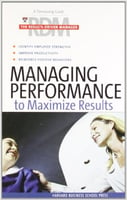Effective supplier performance management is more than just the best KPIs. In fact, many...
Applying Performance Management Techniques to Agency Evaluation (Part 1)

I recently reading a terrific book by Harvard Business School Press called "Managing Performance to Maximize Results". It is a compilation of articles, all based around Human Resources Performance Management.
What drew me to read it was to investigate parallels between HR Performance Management and Strategic Agency Management.
A great deal of theoretical research and practical study has gone into the manager/employee performance management process and I believe we can leverage this body of work to apply to the domain of agency relationship management.
Fundamental Drivers of Agency Evaluation
The first page of the book reveals the fundamentals of how performance management can generate better business results. (I have taken the liberty to insert the appropriate 'supplier relationship' text)
- Determine how well the team (client and supplier/agency) is meeting organizational goals
- Identify important strengths on which your suppliers / agencies can build
- Discover opportunities for improvement in individual supplier / agency skills and processes
- Craft development action plans for each of your suppliers / agencies
- Make key decisions about compensation and rewards
- Document patterns of poor performance that protect your company from legal liability if suppliers / agencies must be let go
Best-practice Performance Management
Further, their research identifies the characteristics of 'best practice' performance management systems (and again, I hope the parallels with supplier management systems are clear):
- ongoing, two-way exchanges of feedback between manager & employee
- regular "coaching" sessions between manager & employee
- separation of conversations devoted to development and compensation
- an explicit link between performance goals and high-level company objectives
What's in a name? Is Evaluation a negative?
The authors raise a point about how performance management systems are viewed - and named accordingly.
For example, does the term "Performance Evaluation" lead to the perception that the process is complete once a final score or rating has been determined? Or should we communicate via "Performance Management" that data will be used to build development plans for the upcoming year?
Should we follow the lead of the Human Resources sector and move on from the term "Performance Appraisal" to adopt more contemporary descriptors like "Performance Management" or "Professional Development"?
Using Action Plans to drive us we want to go!
The fact is, the evaluation data is historical and viewing it as the goal could lead to a 'rear view mirror' approach to relationship management. Surely we want to shift our focus to the present and then to the future, leveraging off the information that the evaluation scorecard has provided us - guiding us to where we need to go - rather than where we have been!
Author: Richard Benyon (Decideware)




